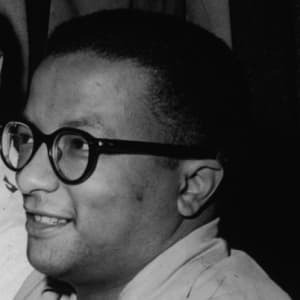
Charles S. Johnson
Charles S. Johnson was a sociologist and university president best known for his work on race relations in the United States and Liberia.
Synopsis
Charles S. Johnson was born on July 24, 1893, in Bristol, Virginia. Trained in sociology at the University of Chicago, Johnson studied and wrote about race relations in the United States and abroad. He founded the groundbreaking journal Opportunity and became, in 1946, the first African American president of Fisk University. Johnson died in Louisville, Kentucky, on October 27, 1956.
Early Life and Education
Charles Spurgeon Johnson was born on July 24, 1893, in Bristol, Virginia. Both his father—a Baptist minister—and his mother championed education. They sent Johnson to a boarding school and then to Virginia Union University in Richmond to study sociology. Johnson embarked on his graduate studies at the University of Chicago, where he worked with sociologist Robert Ezra Park. He interrupted his academic work to serve as an officer in France during World War I.
Career
In 1919, race riots broke out in a number of United States cities, including Chicago. Charles S. Johnson worked for a citywide commission on race relations. He wrote up his sociological study of the Chicago riot in the book The Negro in Chicago: A Study of Race Relations and a Race Riot, published in 1922. The book became a classic in the field of urban sociology. Johnson also began working for the National Urban League during his time in Chicago.
Johnson married Marie Antoinette Burgette in 1920 and the couple moved to New York City, where Johnson served as research director for the National Urban League. He also founded the magazine Opportunity: A Journal of Negro Life, which was an official publication of the Urban League.
Fisk University and Political Involvement
Having launched his career in the northern United States, Johnson was determined to apply his knowledge and analytic skill to the South. He accepted a teaching position at Fisk University—a position he held from 1928 until 1946. The research projects he directed at Fisk ultimately became two classic monographs in the field: Shadow of the Plantation (1934) and Growing up in the Black Belt (1940). In 1946, Fisk University—a historically black institution—appointed Johnson as its first African American president.
In addition to his work in American cities, Johnson was marshaled to help analyze and resolve racial tensions abroad. He participated in a League of Nations commission in Liberia, investigating presidential corruption and conditions of slave labor. As a result of the inquiry, both the president and vice president of Liberia were forced to resign. Johnson also contributed to education reform in Japan following World War II.
Over the course of his career, Johnson was called upon to take part in a number of federal commissions and White House advisory boards. He received honorary degrees from a range of institutions in the United States and Europe, including Columbia University, Harvard University and Glasgow University in Scotland.
Death and Personal Life
Charles S. Johnson died of a heart attack on October 27, 1956, in Louisville, Kentucky. At the time of his death, Johnson was traveling from Nashville, Tennessee, to New York by train. He was 63 years old. Although Johnson did not live to see the passage of major civil rights legislation in the 1960s, his work contributed significantly to movement that ushered in these advances.
Charles and Marie Antoinette Burgette Johnson had four children: Charles Jr., Robert, Patricia and Jeh. On October 17, 2013, several media outlets reported that President Barack Obama would appoint Jeh Johnson to lead the Department of Homeland Security.



